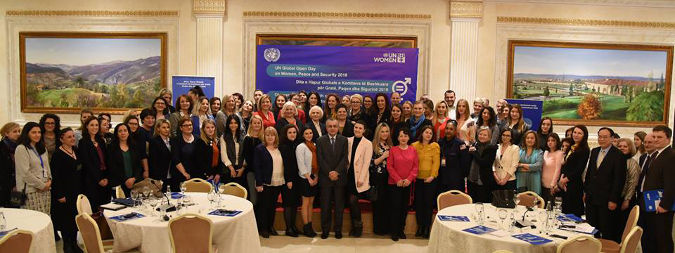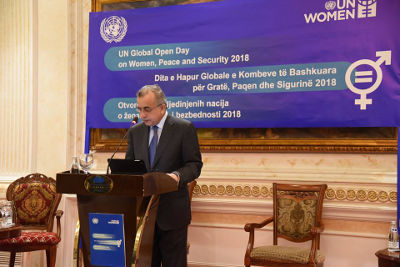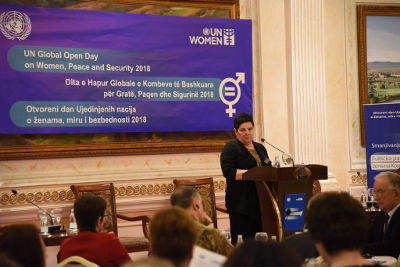Global Open Day in Kosovo focuses on changing laws and patriarchal attitudes to boost women’s political participation
The 2018 Global Open Day on Women, Peace and Security in Kosovo focused on women’s political participation, and the key factors that inhibit their full engagement in the public sphere.Date:

Women face cultural and societal obstacles in Kosovo[1] that inhibit their political participation, according to attendees at a dialogue held on 5 March in Pristina for the UN Global Open Day on Women Peace and Security.
Organised by UN Women and the UN Mission in Kosovo (UNMIK), the dialogue brought together leading women from politics, civil society organisations (CSOs) and international community representatives.

Examining the personal experiences and obstacles faced by women candidates from the 2017 elections in Kosovo, participants agreed that a lack of sustainable support from political parties, discrimination and stereotyping of candidates, and limited capacity-building opportunities were key challenges inhibiting women’s participation in politics and decision-making in Kosovo.
Speaking at the event, Zahir Tanin, Special Representative of the Secretary-General and Head of the United Nations Mission in Kosovo, noted that women needed political representation and access to political decision-making before they could exercise equal influence for good governance and sustainable peace.
Xhavit Haliti, Deputy President of the Assembly of Kosovo, emphasized the importance of equal engagement of men and women.

Calling for an increased engagement with men and boys to ensure that women have more equal opportunities in politics, Flora Macula, UN Women Kosovo Head of Office, said: “Democratization of political parties is key for women’s inclusion in decision-making.”
Women candidates pointed to cultural and societal barriers which inhibit women’s political engagement. CSO representatives agreed, noting that the current patriarchal society contributes to a lack of political will that limits public engagement space for women.
Discussions also addressed gender quotas. Panellists pointed to the shortfalls in Kosovo in the Law on Elections, which requires political parties to list 30 per cent female candidates, and the Law on Gender Equality, which stipulates that political parties should take measures to achieve equal representation of women and men.
They noted that an absence of a harmonized legal framework to achieve gender equality and a poor political will to implement the legal framework combine to obstruct gender equality and women’s political participation.
[1] All references to Kosovo on this website shall be understood to be in full compliance with UN Security Council Resolution 1244 (1999).